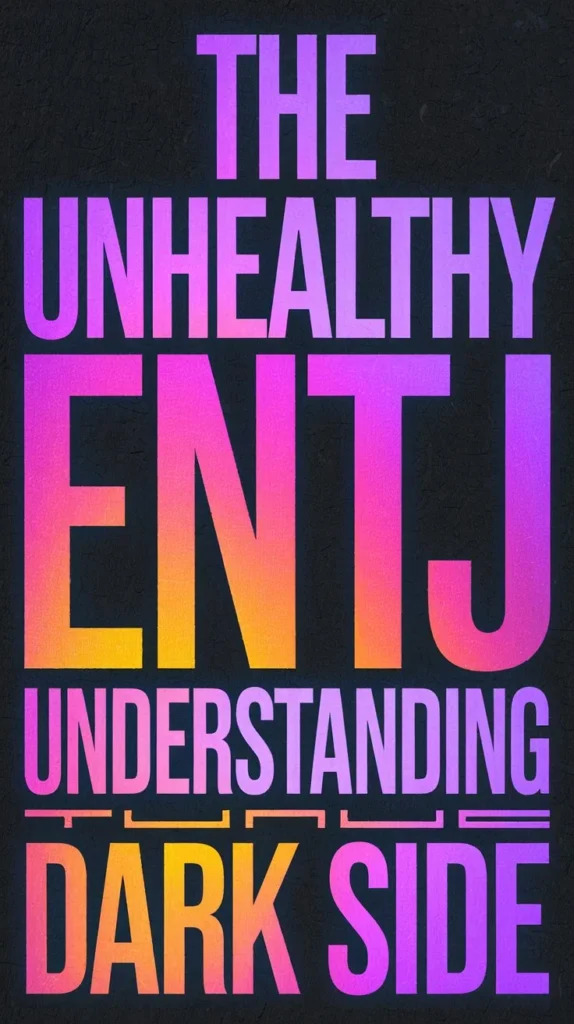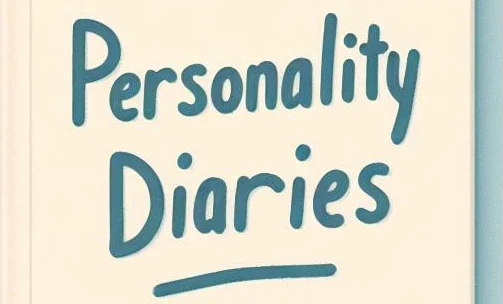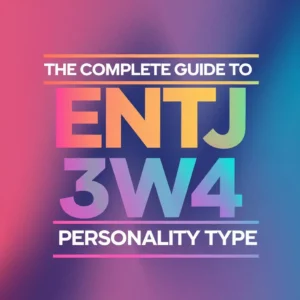You’re likely familiar with the charismatic and confident ENTJ personality type, known for their natural leadership abilities and drive for success. But what happens when this drive for dominance turns toxic? When does their charm become manipulation, and their ambition, ruthless?
You may have encountered or even be an ENTJ who’s struggling with the darker aspects of their personality, where a need for control and efficiency leads to emotional deception and strained relationships.
As you explore the complexities of the unhealthy ENTJ, you’ll uncover the warning signs and consequences of unchecked ambition – and the possibility of transformation.
In a Nutshell

- Unhealthy ENTJs prioritize efficiency and control over emotional understanding, leading to transactional relationships and micromanaging.
- They masterfully manipulate emotions to achieve desired outcomes, creating a false sense of connection and intimacy.
- Ruthless ambition leads them to prioritize their goals over others’ well-being, crushing dreams and aspirations without empathy.
- Their confidence can morph into arrogance, causing them to dismiss others’ opinions and ignore potential pitfalls.
The Tyranny of Dominance
When an ENTJ’s dominant function, Extraverted Thinking (Te), becomes overly dominant, it can lead to a tyranny of logic, where you prioritize efficiency and control over emotional understanding and empathy.
You may start to view relationships as mere transactions, where people are seen as means to an end rather than individuals with their own needs and feelings.
Your dominant personality can take over, causing you to become overly critical and perfectionistic.
You may start to micromanage others, dictating every step and decision, and become frustrated when they don’t comply.
This controlling behavior can lead to feelings of resentment and rebellion in those around you.
As you continue down this path, you may start to alienate those closest to you, causing you to feel isolated and disconnected.
It’s vital to acknowledge when your need for control and efficiency is overshadowing your ability to connect with others on a deeper level.
Manipulation as a Default
As you increasingly prioritize efficiency and control, you may find yourself relying on manipulation to get what you want from others, often without even realizing it.
This can manifest in subtle ways, such as using social influence to persuade others to see things from your perspective or making calculated requests that appeal to their emotions.
You may convince yourself that you’re simply being strategic or effective, but in reality, you’re leveraging your charisma and persuasive abilities to get what you want, even if it means bending the truth or exploiting others’ weaknesses.
This moral flexibility can be a slippery slope, leading you to justify questionable actions as necessary for achieving your goals.
You may begin to view others as pawns to be moved or obstacles to be overcome, rather than as individuals with their own agency and autonomy.
As you continue down this path, you risk damaging relationships, eroding trust, and compromising your own values.
It’s vital to recognize when you’re relying on manipulation and take a step back to re-evaluate your motivations and actions.
The Charisma of Deception
As you examine the unhealthy ENTJ‘s behavior, you’ll notice they’ve a remarkable ability to charm and persuade others, often by manipulating emotional responses to get what they want.
However, upon closer inspection, you may discover hidden agendas behind their charismatic facade.
It’s crucial to acknowledge these tactics to avoid being swept up in their deceptive charm.
Manipulating Emotional Responses
You often find yourself effortlessly charming others, using your charisma to manipulate their emotional responses and achieve your desired outcomes.
As an unhealthy ENTJ, you’ve mastered the art of emotional manipulation, becoming an expert at pulling the strings of those around you. You’re an emotional puppeteer, expertly orchestrating feelings to get what you want.
This sentimental exploitation can be incredibly effective, but it comes at a cost. By exploiting others’ emotions, you’re not only damaging relationships but also reinforcing a sense of self-importance and control.
When you manipulate emotional responses, you create a false sense of connection and intimacy. People are drawn to your charisma, but they’re also wary of your motives.
They may sense that you’re using them, but they can’t quite put their finger on how. This ambiguity creates a power dynamic that’s both intoxicating and toxic.
As you continue to rely on emotional manipulation, you’ll find yourself increasingly isolated, surrounded by people who are more akin to pawns than genuine connections.
Hidden Agendas Revealed
Behind the façade of charm and charisma, unhealthy ENTJs harbor hidden agendas, cleverly disguising their true intentions with a silver tongue and a calculated smile. You might be unaware of the underlying motives driving their actions, but rest assured, they’re always working towards a strategic advantage.
As you interact with an unhealthy ENTJ, it’s crucial to acknowledge the subtle cues that reveal their hidden insecurities and secret motivations.
Overly flattering comments can be a red flag. Be cautious when they shower you with excessive praise, as this might be a tactic to gain your trust or manipulate your emotions.
Vagueness about their goals is another indicator. If they’re evasive about their objectives or consistently change their story, it may indicate they’re hiding something.
Inconsistencies in their words and actions are also a warning sign. Pay attention to when their words don’t align with their behavior, as this could be a sign of deception.
Overreliance on charm can be a giveaway. When they rely too heavily on their charm to get what they want, it may be a sign of hidden agendas.
Avoidance of accountability is a major red flag. If they consistently deflect responsibility or blame others for their mistakes, it could indicate a lack of transparency and integrity.
Power-Hungry and Ruthless
As you examine the behavior of an unhealthy ENTJ, you’ll notice they often prioritize their own ambitions over others’ well-being, crushing dreams and aspirations in the process.
They’re masters of manipulation, using their charisma to get what they want, even if it means bending the truth or exploiting others’ vulnerabilities.
Crushing Others’ Dreams
You may think you’re helping others by being brutally honest about their chances of success, but in reality, you’re crushing their dreams. ENTJs with a ruthless streak take great pleasure in dismantling others’ ambitions, often under the guise of ‘tough love‘ or ‘realism,’ but in reality, this behavior stems from a deep-seated need for control and dominance.
You might justify your actions by telling yourself that you’re saving them from disappointment or failure, but deep down, you’re motivated by a desire to assert your power and influence over others.
You frequently point out the flaws in others’ ideas, even when they’re enthusiastic about them.
You ‘accidentally’ forget to follow up on commitments or provide support when others need it.
You make backhanded compliments or offer ‘constructive criticism‘ that’s really just criticism.
You use your charisma to persuade others to abandon their goals and pursue something more ‘practical’.
You secretly enjoy watching others struggle or fail, feeling a twisted sense of validation when you’re proven right.
Manipulating for Control
When you’re not busy crushing others’ dreams, you’re likely manipulating people to get what you want, using your exceptional charisma to bend others to your will.
You’ve mastered the art of social engineering, knowing exactly which buttons to press to get the desired response.
Your power play is subtle yet effective, making others feel like they’re making their own decisions when, in reality, you’re pulling the strings.
You’re a master of persuasion, using your quick wit and charm to influence others.
You know how to make people feel important, heard, and valued – all while getting them to do your bidding.
Your manipulation is often disguised as helpfulness or concern, making it difficult for others to see through your tactics.
But make no mistake, your ultimate goal is control.
You crave the power to shape situations and people to your advantage, even if it means stepping on others to get there.
And once you’ve achieved your objective, you’ll stop at nothing to maintain your grip on the reins.
Disregarding Human Emotions
As an ENTJ, you tend to prioritize logic over emotional consideration, which leads you to frequently dismiss or minimize the feelings of others, often unintentionally causing harm or offense.
This can be a major blind spot for you, as you may not even realize the impact your words or actions have on those around you.
Your emotional numbness can make it difficult for you to understand and validate others’ emotions, leading to feelings of isolation and disconnection.
You may come across as insensitive or uncaring, even if that’s not your intention.
Your empathy deficiency can make it challenging for you to put yourself in others’ shoes and see things from their perspective.
You might prioritize efficiency and productivity over emotional well-being, which can lead to burnout and strained relationships.
Your tendency to intellectualize emotions can make it difficult for you to connect with others on a deeper level, leading to feelings of loneliness and disconnection.
The Cost of Unchecked Ambition
As an ENTJ, you’re driven to succeed, but when ambition takes over, you may find yourself sacrificing everything else.
You’ll stop at nothing to reach the top, even if it means trampling others and exhausting yourself in the process.
But what’s the ultimate cost of this relentless pursuit of power, and will you be left standing alone, burned out and drained?
Ruthless Pursuit of Power
Your relentless drive for success can lead you to trample others, sacrifice relationships, and compromise your values in the process of achieving your goals.
You may not intend to hurt others, but your single-minded focus can make you oblivious to the impact of your actions. As you climb the corporate ladder, you may find yourself entangled in power struggles, where you’re forced to make difficult choices that blur the lines of moral ambiguity.
You prioritize winning over being liked or respected by others.
You’re willing to do whatever it takes to stay ahead, even if it means bending the rules.
You justify your actions by telling yourself that the ends justify the means.
You’re constantly comparing yourself to others, and you feel like you’re in a never-ending competition.
You’ve become so focused on your goals that you’ve lost sight of what truly matters to you.
Burning Out Alone
Unchecked ambition can consume your life, leaving you drained, isolated, and wondering why the thrill of success isn’t fulfilling the void that’s grown inside you.
As an ENTJ, you’re wired to push boundaries and pursue excellence, but at what cost? You’ve sacrificed relationships, hobbies, and even your own well-being to reach the top.
Now, you’re paying the price. You’re experiencing lonely exhaustion, a state of emotional and physical depletion that’s hard to shake.
You’re tired, but you can’t stop. You’re driven by an insatiable need to achieve, even when it’s clear you’re running on empty.
Your silent suffering is a heavy burden, one you carry alone, afraid to show vulnerability or weakness.
You’ve convinced yourself that vulnerability is a liability, but it’s actually a sign of strength.
Your relentless pursuit of success has led to a life of isolation. You’ve lost touch with friends and family, and your relationships are superficial at best.
You’re left with a sense of emptiness, a feeling that something is missing.
It’s time to acknowledge the toll your ambition has taken on your life and make a change.
It’s time to find a healthier balance between success and self-care.
Emotional Intelligence Deficit
As an ENTJ, you may struggle with emotional intelligence due to your tendency to prioritize logical reasoning over emotional awareness. This often leads to a pronounced deficit in emotional intelligence, causing you to struggle with empathizing and understanding others’ emotional needs.
This emotional blindness can manifest in various ways, including:
- Difficulty recognizing and validating others’ emotions, leading to feelings of frustration and resentment
- Social awkwardness in emotionally charged situations, causing you to feel uncomfortable and unsure of how to respond
- Struggling to understand the emotional nuances of relationships, leading to conflicts and misunderstandings
- Tendency to intellectualize emotions, which can come across as insensitive or uncaring
The Dark Side of Confidence
ENTJs’ confidence, while often an asset, can have a dark side when it morphs into arrogance, leading you to dismiss others’ opinions and ignore potential pitfalls.
This fearless arrogance can cause you to overlook vital details, leading to overconfidence pitfalls that ultimately hinder your progress.
You may start to believe that your way is the only way, and anyone who disagrees is simply wrong.
This close-mindedness can lead to poor decision-making, as you’re not considering alternative perspectives or potential consequences.
When you’re caught up in your own confidence, it’s easy to disregard others’ input and warnings.
You may come across as condescending or dismissive, causing others to feel undervalued and unheard.
This can lead to strained relationships and a lack of collaboration, ultimately holding you back from achieving your goals.
Recognizing when your confidence is teetering into arrogance is vital, and taking a step back to listen to others and consider alternative viewpoints is necessary.
Entitlement and Expectations
With their strong sense of self-worth and accomplishment, you may start to feel that you’re owed certain privileges or treatment, leading to an unhealthy sense of entitlement that can damage relationships and hinder personal growth.
This attitude can stem from an overinflated ego, causing you to believe you’re superior to others and deserving of special treatment.
As a result, you may set unrealistic standards for yourself and others, becoming dissatisfied and critical when these expectations aren’t met.
This can lead to feelings of frustration, resentment, and even anger.
Some common signs of unhealthy entitlement and expectations include:
- Expecting special privileges or treatment without putting in the effort
- Becoming overly critical or dismissive of others who don’t meet your standards
- Feeling angry or resentful when your expectations aren’t met
- Believing you’re above the rules or norms that apply to others
Unhealthy Competition Dynamics
Your competitive drive can sometimes morph into an unhealthy obsession, causing you to perceive others as threats to your success and triggering a constant need to outdo them.
This mindset can lead to unhealthy rivalry, where you’re more focused on beating others than improving yourself. You might start to dismiss valid feedback as a threat to your ego, and instead, seek out invalid feedback that confirms your biases.
This creates a toxic cycle where you’re constantly comparing yourself to others, trying to one-up them, and dismissing constructive criticism.
As a result, your relationships suffer, and you find yourself isolated from others.
You might even start to sabotage others’ efforts or undermine their accomplishments to maintain your perceived superiority.
This unhealthy competition dynamic not only harms your relationships but also stunts your personal growth.
You’ll miss out on opportunities to learn from others and improve yourself, as you’re too busy trying to outdo them.
It’s crucial to acknowledge when your competitive drive is taking a dark turn and make a conscious effort to shift your focus from beating others to improving yourself.
The Isolation of Superiority
As you continually seek to assert your superiority, you’ll likely find yourself increasingly isolated from others, who begin to view your condescending attitude and constant one-upmanship as off-putting and alienating.
Your elitist mentality, once a driving force behind your accomplishments, now serves as a barrier between you and those around you. You’ve climbed to a lonely pedestal, where the air is thin and the view is isolating.
Some warning signs to watch out for:
- You find yourself surrounded by ‘yes-men‘ who are too intimidated to challenge your opinions.
- You’ve stopped attending social gatherings, deeming them ‘beneath’ you.
- You’re more likely to lecture than listen, dominating conversations with your expertise.
- You’ve developed a sense of disdain for those who don’t meet your lofty standards.
As you gaze out from your pedestal, remember that true greatness isn’t about being better than others, but about lifting them up alongside you.
It’s time to reevaluate your priorities and rediscover the value of connection and community.
Fear of Vulnerability Exposure
You’ve mastered the art of projecting confidence and authority, but beneath the façade, a deep-seated fear of vulnerability exposure festers, threatening to undermine your entire sense of self.
This fear drives you to engage in fear avoidance, going to great lengths to conceal your weaknesses and insecurities from others.
You’ve become adept at emotional hiding, expertly masking your true feelings behind a mask of confidence and control.
However, this constant need to present a perfect exterior takes a toll on your mental and emotional well-being.
You may feel suffocated by the pressure to maintain this charade, leading to feelings of anxiety, stress, and burnout.
Your fear of vulnerability exposure also prevents you from forming genuine connections with others, as you’re hesitant to open up and be vulnerable.
Unrelenting Criticism and Blame
Criticism and blame become a constant companion, with every perceived shortcoming or mistake serving as fuel for a relentless inner dialogue that heaps scorn and condemnation upon yourself.
You’re extremely hard on yourself, and this self-criticism can be overwhelming. Harsh feedback, whether from others or your own self-doubt, can lead to destructive scrutiny, making you question your abilities and judgment.
Some common signs of unrelenting criticism and blame include:
- You’re prone to negative self-talk, always focusing on what went wrong rather than what went right.
- You have unrealistically high expectations for yourself, setting you up for disappointment and self-blame.
- You’re overly critical of others, mirroring the harsh standards you hold yourself to.
- You struggle to forgive yourself for past mistakes, dwelling on them instead of moving forward.
Self-Awareness and Accountability
By recognizing the destructive patterns of unrelenting self-criticism, you can take the first step toward developing self-awareness and accountability, acknowledging the need to balance high standards with realistic expectations and compassion.
This self-reflection allows you to identify the mental blinders that obscure your perception, preventing you from seeing the harm caused by your intense self-scrutiny.
As you confront your personal demons, you’ll realize that your high standards, though well-intentioned, can lead to burnout and emotional exhaustion.
Accountability comes into play when you acknowledge the impact of your actions on yourself and others.
By taking ownership of your emotions and behaviors, you can begin to make amends and work towards positive change.
This doesn’t mean letting yourself off the hook, but rather, it means being honest about your motivations and the consequences of your actions.
By doing so, you’ll develop a more realistic sense of self, one that acknowledges strengths and weaknesses alike.
This newfound self-awareness will enable you to approach challenges with a more nuanced perspective, one that balances ambition with empathy and understanding.
Breaking Free From Toxic Patterns
As you work to break free from toxic patterns, you’ll need to develop a keen sense of awareness about the cycles that are holding you back.
This means recognizing the signs that you’re slipping into old habits, and being honest with yourself about the consequences of staying stuck.
Toxic Cycle Awareness
You often find yourself stuck in toxic cycles, repeating the same destructive patterns that leave you feeling drained, frustrated, and helpless. It’s like being trapped in a never-ending loop, and you can’t seem to break free. This is the result of cycles of denial, where you refuse to acknowledge the harm these patterns are causing.
But, it’s time for a toxic awakening.
To become aware of these toxic cycles, ask yourself:
Are you constantly people-pleasing, even when it goes against your own needs and values?
Do you find yourself in relationships that are emotionally draining or abusive?
Are you stuck in a pattern of self-sabotage, holding yourself back from achieving your goals?
Do you have a tendency to blame others or circumstances for your problems, rather than taking responsibility?
Are you ignoring your own emotional needs, suppressing feelings of anger, sadness, or fear?
Recognizing these patterns is the first step towards breaking free from the toxic cycles that hold you back.
Self-Imposed Boundary Setting
Establishing self-imposed boundaries is a crucial step in breaking free from toxic patterns, as it allows you to reclaim control over your life and prioritize your own needs.
By setting boundaries, you’re able to regulate your own behavior, making conscious choices that align with your values and goals. This self-regulation is essential for breaking the toxic cycle of people-pleasing and self-neglect.
| Boundary Creation | Self-Regulation |
|---|---|
| Identifying and communicating your limits | Recognizing and respecting your own needs |
| Setting realistic expectations with others | Prioritizing your own well-being over others’ demands |
| Learning to say ‘no’ without guilt or shame | Practicing self-care and self-compassion |
| Establishing consequences for boundary violations | Holding yourself accountable for your actions |
Frequently Asked Questions
Can ENTJS Change Their Behavior Once They Recognize Their Dark Tendencies?
You can change your behavior once you recognize your dark tendencies by embracing personal growth through self-reflection, acknowledging your flaws, and actively working to develop healthier habits and thought patterns that foster a more balanced you.
Are Unhealthy ENTJS More Prone to Mental Health Issues Like Depression?
You might wonder, are you more prone to mental health issues like depression when struggling with dark thoughts and masked emotions? Research suggests that suppressed emotions can indeed contribute to depression, and ENTJs are no exception.
How Do You Deal With an Unhealthy ENTJ in a Romantic Relationship?
When dealing with an unhealthy ENTJ in a romantic relationship, you’ll face toxic dominance and emotional manipulation. Set clear boundaries, prioritize self-care, and recognize their tactics to avoid emotional exhaustion and maintain a healthy dynamic.
Can Unhealthy ENTJ Traits Be Inherited or Are They Learned Behaviors?
You wonder if unhealthy ENTJ traits are inherited or learned. Research suggests it’s a mix: genetic predisposition can influence personality, but environmental influence, like upbringing and life experiences, also shapes behavior, making it a complex interplay of nature and nurture.
Is It Possible for an Unhealthy ENTJ to Change Without External Consequences?
You can change your unhealthy patterns, but it requires internal motivations and deliberate self-reflection processes, acknowledging your flaws and actively working to correct them, rather than relying on external consequences to spark transformation.







James Green is a seasoned psychologist specializing in narcissism and other personality and relationship issues. With a passion for helping others understand and navigate their own personality traits and relationships, James shares his insights and expertise on his blog, Personality Diaries. Connect with him on Pinterest and Instagram for regular updates and insights.






